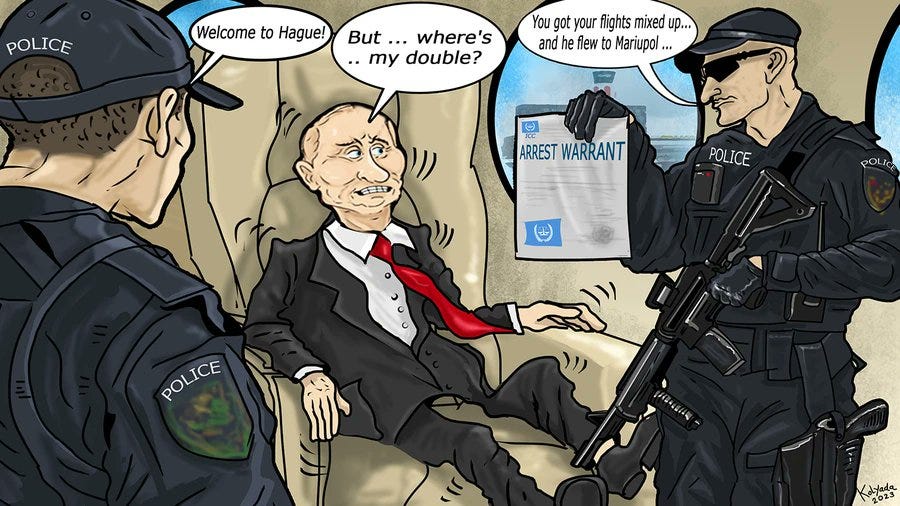Mar 26: Meduza, ‘Like a slap in the face’
"How the ICC’s arrest warrant for Putin left Russia’s top officials shaken" as published in Meduza on March 23, 2023
‘Like a slap in the face’ How the ICC’s arrest warrant for Putin left Russia’s top officials shaken- Meduza
Story by Verstka. Abridged translation by Sam Breazeale.
Earlier this week, Meduza reported on how the International Criminal Court’s decision to issue an arrest warrant against Vladimir Putin caught the Kremlin off guard — not least because the order threatens his ability to travel abroad, which was supposed to be a linchpin of his 2024 presidential campaign. Now, the independent outlet Verstka, citing sources of its own, has published a more detailed account of the confusion that reigned among Russia’s top officials in the hours after The Hague’s announcement. In English, Meduza is publishing an abridged version of that report.

‘The last straw’
For most of the day, March 17 was an ordinary workday in the offices of the Kremlin and the Russian parliament, according to Verstka. Then the International Criminal Court (ICC) announced it had issued arrest warrants for Vladimir Putin and Russian Children’s Rights Commissioner Maria Lvova-Belova. According to a source close to the Kremlin, the news spread “like wildfire” among the country’s top officials, Verstka reported.
“[The information] immediately spread through all of the [Putin administration officials’] informal chat groups,” and “at first, nobody even knew how to react,” the source told Verstka. “Emotions were running high, and [there were] a lot of profanities. You got the feeling that [the West] had crossed a line, that it was like a slap in the face to all of us.”
According to the source, an unusually long amount of time passed — about an hour and a half — before officials received any instructions about how to respond publicly to the news. “Some people rushed to give public comments, but the majority [of politicians and officials] kept silent. You could even call it shock,” said the source. It was only after Russian Foreign Ministry spokesperson Maria Zakharova called the arrest warrant “legally void” that it became clear to other officials what tone their public statements should take.
Read:
The reaction among lawmakers in Russia’s Federation Council was similar, according to two senators who spoke to Verstka. One of them referred to the ICC’s decision as “the last straw” and said that every conversation he’s had with his colleagues since Friday evening has revolved around the question of how to respond to the charges. “We haven’t come up with anything yet,” he said, adding that Russia doesn’t have any special tools that could serve as an “effective response” to The Hague’s warrant. The Russian Investigative Committee’s Monday announcement that it was opening a criminal case against the ICC was “intended more for a domestic audience,” said the source.
A source from the Russian State Duma declined to comment on the reaction among lawmakers in the parliament’s lower chamber, instead sharing his personal feelings about the announcement. “It was very upsetting, as if our fair weather friends had violated the final limits of common sense,” he said. “After that, I wasn’t able to think about anything else; I felt anger and sadness.” In the deputy’s view, the ICC’s decision will negatively impact the Russian authorities’ standing even among friendly counties. “It’s as if our president is some kind of pariah. But we understand that’s not the case; we’re building our own world — not a unipolar one like America would prefer,” he said.
Polarization
Despite aggressive and defiant comments from Russian officials like Security Council Deputy Chair Dmitry Medvedev, Chechnya Governor Ramzan Kadyrov, and State Duma Speaker Vyacheslav Volodin, many lawmakers were privately unsettled by the announcement.

In interviews with Verstka, two sources from Russia’s parliament mentioned Nazi leaders Heinrich Himmler and Joseph Goebbels, who were recognized as international criminals alongside Adolf Hitler. One of the sources also brought up former Libyan dictator Muammar Gaddafi. “This is a kind of blow to us [the Russian government],” he explained. “On one hand, it makes us rally around him. On the other, it’s like we’re truly in global isolation.”
According to a source who works in one of Russia’s federal ministries, the first thought that occurred to Putin’s most active supporters after the ICC’s announcement was that they could also become the targets of war crimes warrants. “It was an instant thought: that [we] might be facing not just sanctions but more serious things, and that it won’t be possible to leave the country,” he said, adding that he personally doesn’t expect to be prosecuted, but that members of the government “very well might.”
A political strategist close to the Kremlin gave a similar account: Russia’s top officials, he said, are actively speculating about who might be next, and what consequences that person might face. “The ICC warrant has divided the loyal and disloyal camps more clearly than before; it’s polarized them,” he said. “Now proximity to the president isn’t just talk; it’s a real step towards being prosecuted by international law enforcement.” At the same time, a source from the Federation Council told Verstka that the arrest warrant is unlikely to have any effect whatsoever on the loyalty of the people closest to the president, and that “they were already prepared to face any consequences.” But the political strategist disagreed: in the near future, he said, the warrant will become a “true test” for Putin loyalists — “and not everyone will pass it.”




